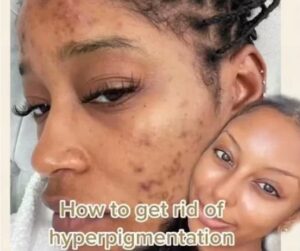Post-inflammatory hyperpigmentation (PIH) refers to the darkening of the skin after an inflammatory skin condition or injury, such as acne, eczema, or a cut. It is a common concern and can affect individuals of all skin types and tones. While PIH is not harmful, it can be distressing for those who experience it.

Fortunately, several skincare approaches and treatments are available to help reduce and manage post-inflammatory hyperpigmentation.
Here’s everything you need to know:
Sun Protection: Protecting your skin from the sun is crucial when dealing with PIH. UV exposure can worsen hyperpigmentation and make it more difficult to fade. Always wear a broad-spectrum sunscreen with a high SPF (at least 30) and reapply it every two hours, especially if you spend time outdoors.
Gentle Cleansing: Use a mild, non-irritating cleanser to wash your face twice daily. Avoid harsh scrubbing or abrasive cleansers that further irritate the skin and worsen hyperpigmentation.
Exfoliation: Incorporating gentle exfoliation into your skincare routine can help promote skin cell turnover and fade PIH. Look for chemical exfoliants containing ingredients like alpha-hydroxy acids (AHAs) or beta-hydroxy acids (BHAs). Start with a lower concentration and gradually increase as your skin tolerates it.
Skin Lightening Ingredients: Several topical ingredients can help lighten post-inflammatory hyperpigmentation. These include:
-
- Hydroquinone: A widely used ingredient for reducing hyperpigmentation. It inhibits melanin production and can be effective but should be used under the guidance of a dermatologist.
- Kojic Acid: Derived from mushrooms, kojic acid inhibits melanin production and can help fade PIH.
- Vitamin C: A potent antioxidant that can brighten the skin and inhibit melanin production. Look for stabilized forms like ascorbic acid or ascorbyl glucoside.
- Niacinamide: This vitamin B3 derivative has anti-inflammatory properties and can help fade hyperpigmentation while improving overall skin tone and texture.
- Azelaic Acid: Known for its skin brightening and anti-inflammatory properties, azelaic acid can help fade PIH and is suitable for sensitive skin.
- Liquorice Extract: Contains compounds that inhibit melanin production and reduce inflammation, making it effective for treating hyperpigmentation.
Retinoids: Retinoids, such as retinol or prescription-strength retinoids like tretinoin, can be beneficial for fading PIH. They promote cell turnover, stimulate collagen production, and help even out skin tone. Start with a low concentration and gradually increase the frequency of use to avoid irritation.
Patience and Consistency: Treating post-inflammatory hyperpigmentation takes time and consistency. It can often take several weeks or even months to see noticeable improvements. Stick to your skincare routine and be patient with the process.
Professional Treatments: In some cases, professional treatments may be recommended to address stubborn or severe PIH. These treatments may include chemical peels, microdermabrasion, laser therapy, or intense pulsed light (IPL) treatments. Consult with a dermatologist or skincare professional to determine the best course of action for your specific situation.
Avoid Picking or Squeezing: Picking at acne or any other inflamed skin condition can worsen PIH and increase the risk of scarring. It’s important to resist the urge to squeeze or pick at your skin to prevent further damage.
Lifestyle Factors: Certain lifestyle habits can contribute to the development or worsening of PIH
Certainly! Here are some additional lifestyle factors to consider when dealing with post-inflammatory hyperpigmentation (PIH):
- Healthy Diet: Eating a balanced diet rich in fruits, vegetables, and antioxidants can support overall skin health. Antioxidants help combat oxidative stress and promote skin healing, aiding in fading PIH.
- Avoid Triggering Factors: Identify and avoid any triggers that may worsen your inflammatory skin conditions, such as certain skincare products, allergens, or irritants. Minimizing inflammation can help prevent or reduce the severity of PIH.
- Manage Stress: Chronic stress can negatively affect the skin’s health and exacerbate various skin conditions, including PIH. Practice stress-management techniques like exercise, meditation, or engaging in activities you enjoy to help maintain healthy skin.
- Proper Wound Care: If you have wounds, cuts, or acne breakouts, ensure they are properly cared for to minimize inflammation and the likelihood of developing PIH. Cleanse the area gently, apply topical treatments, and avoid picking or scratching the affected skin.
- Avoid Tobacco and Alcohol: Smoking and excessive alcohol consumption can impair skin healing and exacerbate hyperpigmentation. Minimizing or avoiding these habits can contribute to healthier skin and improve PIH.
- Moisturize: Keeping your skin adequately moisturized can help improve its overall health and minimize the appearance of PIH. Look for moisturizers that contain hydrating ingredients like hyaluronic acid or ceramides.
- Be Gentle with Your Skin: Treat your skin carefully and avoid excessive rubbing, scratching, or pulling. Use soft, clean towels to pat your skin dry instead of rubbing vigorously. Gentle handling of the skin helps prevent further inflammation and damage.
Remember, it’s essential to consult with a dermatologist or skincare professional for a personalized approach to treating post-inflammatory hyperpigmentation. They can assess your skin condition, recommend suitable products or treatments, and guide your skincare journey.